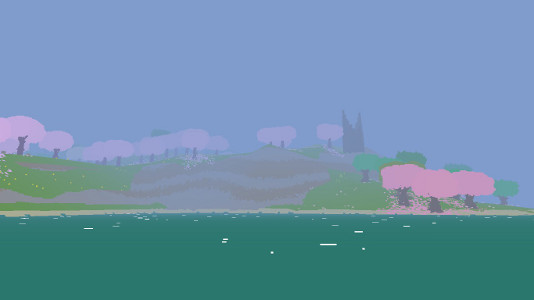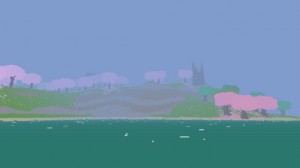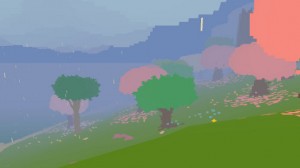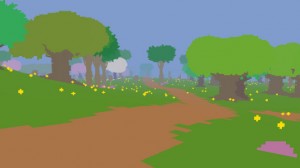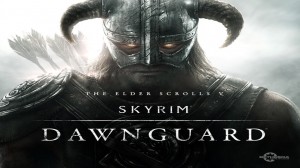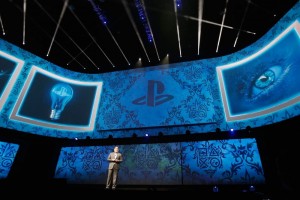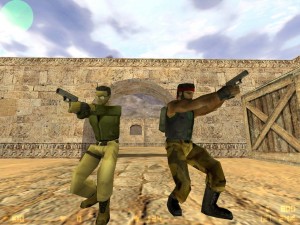This week I bit off a little chunk of what indie games are all about in the form of a game known as Proteus. It has been labeled as a casual game or an auditory and visual journey and it has even been intensely debated as to whether or not it can rightfully be called a game. Now, I am one of those gamers that is always strategically focused on truly exploring a world that I am given access to and figuring out what my role in that world truly is, I like to immerse myself in what a developer has put together through hard work and creative energy and I found that desire to be satiated by what Proteus has to offer. The rest of the gaming world seems to think so too as it has won numerous awards from Indiecade, IGF, Amaze, and Lunarcade for its stellar sound and immersion.
When I first began researching this title, I put off writing about it until the end of my week because I really wanted to ponder this one, wanted to beat this one around in my brain for a while. I had read all sorts of blurbs and comments explaining what this experience was all about and I was aware that the release of the game was definitely being watched by the majority of the indie-gaming community. I went ahead and spent the ten dollars and anxiously downloaded the title to my laptop. I was aware of the talk of “no objectives” and “pure exploration” and it had me a little nervous, I will be honest. Was I going to regret spending money on this? Here I am, a gamer that is famous amongst some of his nerd friends as a hungry, completely objective, why-are-we-standing-around-lets-grind kind of guy. C’mon, who doesn’t try to maximize their time gaming?
The first couple of minutes were pretty uneventful and I panicked thinking that I wasn’t going to enjoy this “game”. But then I looked around for a minute. That minute turned into ten, then twenty, and then I found myself in that place of my mind that welcomes solid immersion, the real reason some of us play games. After a bit of experimentation with movement and ambient sounds I then found myself creating my own objectives. Get to the top of that hill, run toward these frogger-esque blips, and what sound does that make when I get close, the exploration factor is really prominent in this environment. From an artistic standpoint, the game is quite beautiful. The colors are rich and solid in the simple tapestry and the experience is very different from other games that rely on photorealism but this is just as efficient.
For a game that the only objective is to explore a randomly generated island there were definitely a couple of moments that stood out amongst the rest of my time playing. There is a neat moment between the transitions of Night and Day where it appears as though the stars flow down out of the sky to create a whirlwind effect on the ground. When you move directly into the epicenter of the whirlwind, time seems to speed up with a chaotic mixture of all the ambient sounds of the game. It was neat just because up until that point everything about the wandering experience is so tranquil and peaceful. I found playing it to be like running around in a Japanese Zen garden, the island is covered with various forms of trees and plants and small animals like frogs, bird s, even a squirrel or two and encountering each of these inhabitants alters the peaceful soundtrack in ways that are sometimes dramatic and at other times simple. The minimalist art direction really forces you to relax and just walk around exploring; I was easily lost in the moment while playing.
I enjoyed this game immensely and I would say that I don’t believe this is for everyone. But if you are a gamer looking for something different than the stressful and fast-paced titles that can be found everywhere, check out Proteus. It isn’t a free experience; however, ten dollars really isn’t that much for a game like this, I bought it and am happy with my purchase and I am a pretty frugal person when it comes to video games. If nothing else, try it out just to see what neat forms of innovative gameplay are being born of the indie game community. I consider this to be one of the interesting milestones in game design especially for an industry that creates so many clones year after year; Proteus stands out as an experience all on its own.
Interview with Proteus developers Ed Key and David Kanaga
GV: Where did the idea to create something like Proteus come from?
Ed: I’d always wanted to make something that was heavily about landscape. I grew up with mountain views and always took more photos of hills and countryside than anything else. Proteus originally came out of a bunch of prototypes that were all about exploration and somehow being at home in a procedural landscape. Initially it was going to be about survival and perhaps some questing, but when we started talking about music that direction seemed more unique and inspiring.
David: From Ed’s graphics, from walks alone outside, deep listening, slow playing.
GV: Was there an iterative process to designing this game or were you guys aware of exactly what type of experience you were crafting right from the beginning?
David: It was definitely iterative throughout, though there was a mood-space established early on that I don’t think we strayed from too much.
Ed: Yeah, absolutely… I think we had the basic intent of “explore the music in parallel with the terrain” very early in our collaboration, but most of the things after that fell into place slowly, without much design up-front.
GV: Explain your use of ambient sounds, where did the inspiration for some of them come from?
David: The bending sine-tones came from my EP “Scenes from Arcturus” which Ed liked, the rich pads, orchestral samples, came from seeing the flat colors, the mood of those, filling in the color fields with sound detail (sound can function as detail in a visual space)
GV: How many different sounds did it take to create this outside of musical tracks?
David: None, they are all musical tracks!
Ed: Haha, well there’s a couple of tracks off freesound.org for birdsong, rainfall, waves and wind – but I guess those are musical too?
GV: Now that the game is launched, how long did it take the two of you to see this project from start to finish?
David: Just shy of 3 years for me
Ed: About 4 – and the first 3 of those were part time, lots of breaks, letting it all mature and grow at its own pace.
GV: Visually, the game is beautiful! Are there any pieces of art such as film, music, painting, games, etc. that inspired or influenced the direction of this game?
Ed: Originally the style came about from thinking about how old ZX Spectrum games used simple blocks of colour and still managed to be very evocative. I just kept on refining this until it looked pretty much like it does today. I was also influenced by modernist landscape paintings by Paul Nash (especially the colours in Monster Field – https://www.thepictureparlour.com/images/eBay%20images/nash/monsterfield.jpg ) and Art Deco era tourist posters, like this one: https://imgc.allpostersimages.com/images/P-473-488-90/58/5853/BKISG00Z/posters/art-deco-poster-central-park-scene-new-york-city.jpg
I don’t know if you could call it art, but the various ancient stone circles near where I used to live were a big influence for one of the moods. (Pic of Avebury in Wiltshire: https://www.geograph.org.uk/photo/442927 )
David: Some things we read and chatted about while working together: “The Origin of Consciousness in the Breakdown of the Bicameral Mind” by Julian Jaynes, “A Voyage to Arcturus,” by David Lindsay, “The Willows” by Algernon Blackwood, WEIRD FICTION in general, Chuang Tsu.. “The Wicker Man” was an inspiration throughout. I love Kandinsky’s paintings, they’re good maps of how visual spaces can function musically.
GV: A question for us gamers, what games are you currently playing right now?
Ed: I just finished Dishonoured, which was the first “big” game I played in a while. I really loved it. I’m now playing some “comfort gaming” with the original Baldur’s Gate. The game feels really homely to me.
David: Infinite Sketchpad by Tom Lieber and Infinite Doodle by David Johnston (SmudgedCat)
GV: What plans do you guys have for the future in terms of game development?
Ed: I mentioned survival gameplay above – I’m going to try and prototype some ideas for a different take on the exploration genre. Maybe harsher and more dangerous, and hopefully keeping the same “soul” as Proteus.
David: I’m working on some fantasy writing about Infinite Sketchpad!

